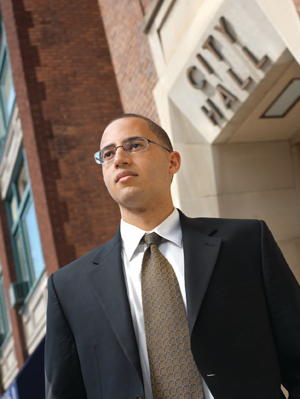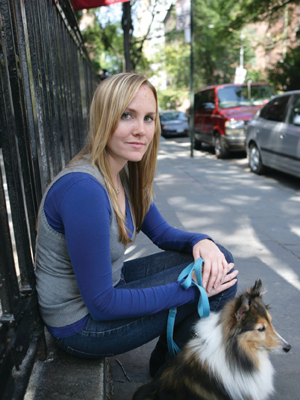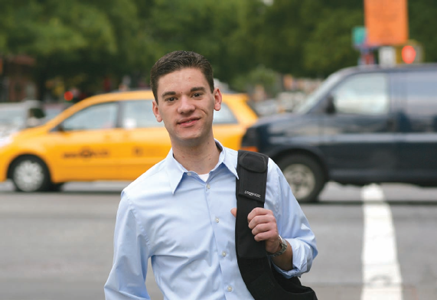On a sweltering day in May, 6,000 graduates waited in Schoellkopf Stadium for the words that would send them out into the world: “Congratulations, Class of 2009.” But instead of the familiar scene of mortar-board caps dotting the blue sky after President David Skorton’s send-off, many simply held onto their hats

Svante Myrick
For this class of Cornellians facing the “Great Recession,” it’s a fitting metaphor—rough economic winds have left the future up in the air. Even Skorton’s Commencement address forced them to face facts. Nationally, less than 20 percent of graduating seniors who applied for jobs actually got one—compared with more than half two years earlier. “Cornellians have advantages in finding employment,” Skorton noted. “Yet I realize from talking with current Cornell seniors that you too face a more uncertain future than you expected even last fall.” As he summed up: “Things are different in this time of recession.”
In September, the Labor Department reported that 6.9 million jobs had been lost since the beginning of 2008 and that unemployment had risen to 9.7 percent, a twenty-six-year high. The total number of Americans out of work, according to the Bureau of Labor Statistics: 14.9 million. “It’s the tightest job market in many years,” says Rebecca Sparrow, MILR ’86, director of Cornell Career Services, “and unprecedented for what students were expecting when they came to Cornell.”

Zac Hine
Take Zac Hine ’09, a chemical engineering major and successful Big Red distance runner. Hine had a job lined up before the second semester of his senior year, thanks to help from the Career Services office and the Engineering college. His future employer, Schlumberger, a global oil-field and information services firm, gave him his choice of a start date. “I thought, I’ll take November,” recalls Hine. “I can do nothing all summer and then go to work. That sounds like a genius idea.”
But then, citing the economy, the company requested he push back his start date three to six months. “They weren’t ready to take on new hires,” Hine recalls. “They were restructuring. I realized that if I pushed it back, I’d be doing nothing for an entire year.” He decided to apply to Cornell for a master’s in energy engineering; the company approved, and he enrolled this fall.
‘Students need to be a lot more flexible now in how they define how they are going to use their skills.’ Hine is just one of many young alumni whose career plans have been derailed—or at least postponed—by the challenging economy. The Bureau of Labor Statistics tallies 1.5 million professional and business services jobs lost since the beginning of the recession, and more than 500,000 in the financial sector— all areas that have traditionally welcomed recent Cornell grads. Even the temp industry, a fall-back for many job hunters, has lost more than 800,000 positions. “Students need to be a lot more flexible now in terms of how they define how they are going to use their skills,” Sparrow says. ” ‘Business degree’ does not mean ‘Wall Street.’ “
Each year, Career Services conducts a postgraduation survey and issues a report detailing the destinations of new Cornell bachelor’s degree recipients. According to the 2008 study, the employers hiring the most Cornellians were Goldman Sachs and Co., JPMorgan Chase, Lehman Brothers, Merrill Lynch, Citi, Microsoft, General Electric, Lockheed Martin, Teach for America, and Cornell University itself. The big names from the financial sector are recognizable for making headlines during the Wall Street meltdown; Lehman Brothers filed Chapter 11 bankruptcy in September 2008, the largest filing in U.S. history. According to the preliminary Class of 2009 postgraduate report, as of July 31 the list again included JPMorgan Chase, Merrill Lynch, General Electric, Teach for America, and Cornell, with the addition of Barclays, Deloitte Consulting, Ernst and Young, and the Peace Corps.
By necessity, graduates who would have traditionally gone into business and finance are seeking opportunities elsewhere. That has made competition keener than ever for organizations like the Peace Corps—which has seen a dramatic hike in applications while being forced to cut positions due to budgetary constraints. In March, Teach for America reported a 42 percent increase over 2008’s record number of applicants, while the acceptance rate dropped as low as 15 percent; AmeriCorps saw a 400 percent increase in applications. “We always have a slightly higher percentage going into the nonprofit and government sectors than most of our peer institutions—it’s part of the culture here,” says Sparrow, noting that Cornell annually sponsors the largest single-school nonprofit career fair. “One thing we might see shifting is that some of those people who would have gone into the business sector may think, How am I going to use those skills in the nonprofit world?”

Caroline Newton
At Commencement 2009, Skorton applauded the graduates who were entering such service organizations—including thirty-two entering the Peace Corps, forty-one joining Teach for America, and 390-plus entering AmeriCorps and other such organizations, along with the eighteen ROTC cadets commissioned into the armed forces. “The world,” he told them, “needs what you have to offer now more than ever.”
Of course, not everyone enters the nonprofit sector as a fallback. At Cornell, Nate Lowry ’08 was involved with the Friends of Farm Workers Program, where he taught ESL to migrant workers. That, and having grown up with a mother who’s a teacher, drew him to Teach for America; he’s currently teaching sixth-grade special education at a middle school in Donna, Texas. “It was something that our generation was doing to help, to not only publicize this issue of the achievement gap, but also as part of something bigger, this national movement,” says Lowry, who ultimately plans to earn a law degree and advocate for students with disabilities. “It was something I could do for a few years and take it from there.”
These days, people like Lowry—who would have sought to join organizations like Teach for America regardless of the economy—are seeing increased competition. Lowry says he knows of many classmates who are still struggling to find permanent jobs—waiting tables or living with their parents. “They certainly aren’t using their degrees, because a lot of places aren’t hiring,” says Lowry. “It becomes easy to get in a rut.” And while graduate school can be an attractive alternative to unemployment, it has its own pressures. Although advanced degrees pay off in the end—according to U.S. News & World Report, an average employee with a bachelor’s degree makes $42,000 a year, while master’s degree holders make roughly 25 percent more and those with professional degrees make more than twice as much—they have upfront costs. “We haven’t seen a huge uptick in graduate school applications, and I think it has to do with the economy,” says Sparrow. “While it’s a scary time to enter the job market, it’s also a scary time to take on additional debt.” But senior class president Caroline Newton ’09, who was ultimately accepted into the Environmental Protection Agency’s Environmental Careers Program, notes that the economy forced her to widen her options to include continuing her education. “Before, I didn’t think of applying to grad school,” she says, “but then I applied anyway.”

Ryan Lavin
According to the Class of 2008 postgraduation survey— which had a 71.6 percent response rate out of 3,394 contacted— 55.2 percent of the class is employed, 32 percent is attending graduate school, and 12.8 percent is pursuing other endeavors. Though the full results of the Class of 2009 report have yet to come in, the initial employment numbers are predictably down— though, Sparrow says, not as much as one might expect, given the bleak economic outlook. By three months after graduation, 56.3 percent of the class had responded (1,888 students out of 3,354 surveyed). Of those, 38.3 percent reported being employed, 33.4 percent was attending grad school, and 28.3 percent was pursuing other endeavors, including about 18 percent still seeking a job.
‘There’s a lot of pressure when you’re going to a school like this to take a high-salary position.’But just because graduates are employed doesn’t mean they’ve found their dream jobs. Some young alums say they’ve felt pressure to aim for security rather than strive for a career they might find more personally or professionally satisfying. “A lot of people are settling for alternative opportunities they didn’t see themselves doing,” Ryan Lavin ’09, an ILR graduate and former president of the Student Assembly, says of his classmates. “Instead, they’re applying to grad school, they’re taking a job in whichever firm in New York that offered them one.” Lavin, who says he did about ten interviews on campus alone, describes an emotionally and physically draining process that involved extensive travel. Now, he says, he is “doing a little of the corporate America thing.” The firm where he works—Ambrose Employer Group, which offers human resources solutions to smaller companies—recruited on campus and has a significant number of Cornellian employees.
For Svante Myrick ’09—a member of the Sun editorial board, president of Quill and Dagger, and the youngest alderman on Ithaca’s Common Council—the career choice of public service was easy. Actually securing a job was the hard part. “There’s a lot of pressure when you’re going to a school like this to take a high-salary position,” says Myrick, who has stayed in Ithaca to complete his four-year council term. The CALS grad and native of Earlville, New York—”a bustling metropolis of about 800 people”—says he was “sweating a little bit” until he got a job teaching career skills to teenagers, stemming from an internship he found through Cornell’s Public Service Center. “A lot of people say those who enter the workforce during a recession, in terms of income or career advancement, never reach the level of those who enter at other times,” he notes.
Each year, Career Services conducts nearly 15,000 advising appointments and walk-in sessions. Located in Barnes Hall, it offers interest assessments, mock interviews, résumé and cover letter critiques, and recruitment and informational fairs for jobs and graduate schools. According to Sparrow, the office’s mission— “where any student can identify, explore, and pursue any career,” a variation on Ezra’s motto—endures despite the economic downturn. “Our model of career development,” Sparrow says, “is understand yourself, explore options, and take action.”
In both the classes of 2008 and 2009, about half of those who secured jobs found them through Career Services; internships or previous employment led to about a tenth of positions. In 2008, about 20 percent found jobs through other methods, including Internet postings, ads, and employment agencies (the figure dropped to about 15 percent in 2009). But Sparrow sees continued success for tech-savvy students who apply online tools to the job market. “Networking is integral,” she says. “Think about how good you are at Facebook and use those same skills.” Connections remain a common way of finding a job: more than 20 percent of graduates from both 2008 and 2009 reported they’d been hired through personal, alumni, or faculty contacts. In this economy, such advantages are more important than ever. The University has formed specific groups to build on its alumni connections on Wall Street and in Silicon Valley; it also runs the Cornell Entrepreneur Network, an ever-expanding, multi-city program connecting more than 4,000 people annually.
According to Career Services, the mean starting salary for Cornell bachelor’s degree recipients has been steadily increasing, from $45,060 in 2006 to $48,708 in 2008. The preliminary 2009 data shows that the average starting salary has increased, albeit minimally, to $48,753. It remains to be seen how the economic downturn will affect future earnings; new graduates may not see the trend continue. Still, some Cornellians stress that despite the challenges, the recession offers an opportunity for self-exploration and personal growth. “These days, everyone needs a Plan B and Plan C,” says Scott Jaschik ’85, a founder of the online publication InsideHigherEd.com. “Suppose this year you don’t get a good job, or any. I wouldn’t advise anyone to say, ‘This isn’t going to work out, so I’m just going to hang out.’ ” Instead, he says, new grads should ask themselves, “How can I learn something this year and make sure my résumé is better— even if my bank account isn’t?”
Sparrow, too, is both realistic and optimistic about the career prospects for young grads. “It puts a little more responsibility on the student to figure out where those opportunities are,” she says. “The flip side is that, in a way, it’s a positive thing: the path was there, but they didn’t think about whether it was right for them. It’d be nice—if it weren’t so painful.” In his Commencement address, Skorton struck a hopeful note. “I have no doubt that virtually all of today’s graduates will find satisfying jobs,” he said, “and that many of you will do it by a road that will be distinctively your own.”
Molly O’Toole ’09 is a master’s candidate in journalism and international relations at NYU.


